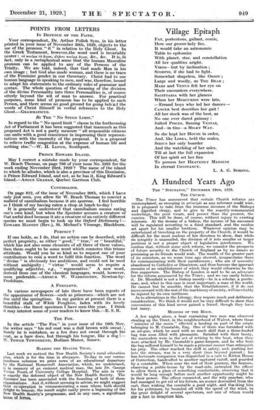A Hundred Years Ago
THE " SPECTATOR," DECEMBER 19TH, 1829. THE Cacacir.
The Times has announced that certain Church reforms are contemplated, as sweeping in principle as any reformer could wish. It is proposed to take from the immense incomes of the -Bishops and dignified clergy, and to give to the scantily-remunerated underlings, the poor VicarS, and poorer than the poorest, the Curates. This will be done, of- course; without injury to existing interests. At the demise of a bishop, the income' of his successor will be regulated. according to a fixed standard, and the residue set apart for his smaller brethren. Whatever opinion may bo entertained of trenching On the property of the Church; it would be difficult for the most zealous of her devotees to show, that while its integrity is =assailed, the division of it into smaller or larger portions is not a proper object of legislative interference. We confess-that, without some' such reform, we consider the prospects of- future- security. to -the Muth of England as by no means so promising as its friends would wish. The wealth of the greater part of its ministers, as we some time ago showed, incapacitates them for Comthunicating with their parishioners ; who • are of necessity abandoned to Catholics or Dissenters, and thus become the ignorant enemies of an establishment of which they would otherwise be the firm Supporters. The Bishop of London is said to be an advocate for the reform announced by the Times ; and we can easily believe it. Dr. Blomfield is not a bishop merely—he is a scholar, a gentle- man, and, what in this case is most important, a man of the world. He cannot but be sensible, that the Establishment, if . it do not /hove onward with the rest of the machinery of society, willinevitably be injured by its own tardiness.
As to alterations in the Liturgy, they require much and deliberate consideration. We think it would not be very difficult to show that concessions of this kind 'never gained a friend, though they have lost many. MINIONS OF THE MOON.
A few nights since, a boat containing two men was observed stealing up the Trent, in the neighbourhood of Walcot, where these " minions of the moon " effected a landing on part of the estate belonging to M.' Constable, Esq. One of them was furnished with an air-gun, which he used with so much skill that a three-bushel bag was_ soon filled with pheasants.- Satisfied with their booty, the marauders were in the act of retiring to the boat, when they were attacked by Mr. Constable's game-keepers, and he who bore the bag suffered himself to be made a prisoner sooner than relinquish his prey. The other reached the skiff in safety, and, .pushing her into the stream, was in a very short time beyond pursuit.; his less fortUnate companion was 'dispatched' in a-cart te Killen House
of Correction, handcuffed to another captured -caitiff, and ed by a constable. When. near the end of their journey, the n,
observing a• public-house by the road-side, entreated the officer to allow them a glass of something corrifortable, observing that it would he long enough before 'such' another opportunity might be in their power.. The officer consented-, and- the wily poaeher, who had _managed to get rid of his fetters, no sooner descended from the cart, than wishing the constable a good night, and thanking him for his politeness, he bounded off with the speed of the wind, to the 'great delight of several' spectators, net' one 'of whom would stir a foot to recapture him.


































 Previous page
Previous page